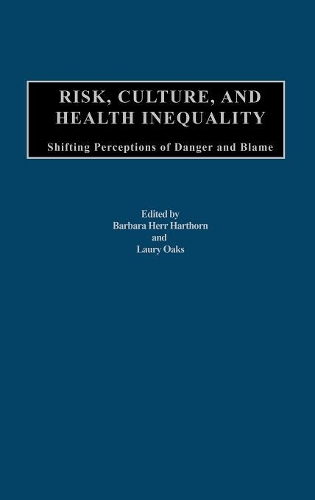
Risk, Culture, and Health Inequality: Shifting Perceptions of Danger and Blame
(Hardback)
Publishing Details
Risk, Culture, and Health Inequality: Shifting Perceptions of Danger and Blame
By (Author) Barbara H. Harthorn
Edited by Laury Oaks
Bloomsbury Publishing PLC
Praeger Publishers Inc
30th April 2003
United States
Classifications
General
Non Fiction
Health systems and services
362.1042
Physical Properties
Hardback
256
Description
Examines the diverse uses and abuses of risk by social actors across a wide range of cultural, ethnic, and geographical locales. The introductory chapter by the two co-editors analyzes and contextualizes current scholarly debates on the social, cultural, and political construction of risk. It is followed by an overview on the anthropology of harm reduction that outlines an innovative framework for culturally informed risk analysis. The remaining nine chapters are organized into three sections, The Cultivation of Fear, Perceptions of Health, Safety, and Hazard: Risk Makers and Risk Takers, and Regulating Risk and the Public's Health. The book aims to address a set of questions of theoretical and practical importance to anthropologists, sociologists, public health scholars and professionals, and public policy advocates, among others. These questions include: How do individuals conceptualize and respond to risk Can risk be a tool of empowerment for individuals and communities who define themselves as at-risk How has risk figured recently in the production of health inequality Has the social contract to provide care in its broadest sense expanded or contracted around issues of risk Are risk and the imperative to adhere to risk warnings used by experts as a means of social control The volume's contributors, medical anthropologists and sociologists, provide rich, grounded ethnographic case material on the processes at work in everyday social life around the globe, as individuals and groups struggle to make saense of the health risks and inequities in their lives and communities. Authors address an array of urgent health concerns, ranging from food safety to environment, new technologies to infectious disease, in such contrasting locales as the US, Europe, South and Southeast Asia, and North Africa, and across diverse ethnicities and social classes.
Reviews
"This collection of lucid and compelling case studies of 'the epistemology of risk' highlights the consequences of our growing proclivity to frame ever more diverse aspects of experience in terms of fear, hazard, and danger. By deconstructing the links between health risk and health inequality, the collection brilliantly illuminates both phenomena."-Carole Browner Professor, UCLA School of Medicine
"This excellent collection examines risk as a 'fluctuating, socially seismic field' linked to the dynamics of power, oppression, self-perception, and even resilience. In doing so, it makes vital contributions to the literature on risk and the study of health inequality."-Elisa Sobo Research Scientist, Center for Child Health Outcomes, Children's Hospital, San Diego
[I]lluminates the socially constructed nature of all risks, and the fact that risk both produces and makes visible health inequalities.-SciTech Book News
"Illuminates the socially constructed nature of all risks, and the fact that risk both produces and makes visible health inequalities."-SciTech Book News
"[I]lluminates the socially constructed nature of all risks, and the fact that risk both produces and makes visible health inequalities."-SciTech Book News
Author Bio
BARBARA HERR HARTHORN is Associate Director, Institute for Social, Behavioral, and Economic Research, Co-Director, Center for Global Studies, and Assistant Research Anthropologist, at the University of California, Santa Barbara. LAURY OAKS is Associate Professor, Women's Studies Program, University of California, Santa Barbara.
